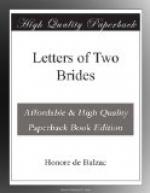Now, Louise, can you realize the torture to me of knowing that I had displeased you, while entirely ignorant of the cause? The ideal double life which seemed so fair was cut short. My heart turned to ice within me as, hopeless of any other explanation, I concluded that you had ceased to love me. With heavy heart, and yet not wholly without comfort, I was falling back upon my old post as servant; then your letter came and turned all to joy. Oh! might I but listen for ever to such chiding!
Once a child, picking himself up from a tumble, turned to his mother with the words “Forgive me.” Hiding his own hurt, he sought pardon for the pain he had caused her. Louise, I was that child, and such as I was then, I am now. Here is the key to my character, which your slave in all humility places in your hands.
But do not fear, there will be no more stumbling. Keep tight the chain which binds me to you, so that a touch may communicate your lightest wish to him who will ever remain your slave, FELIPE.
XXIV
LOUISE DE CHAULIEU TO RENEE DE L’ESTORADE
October.
My dear friend,—How is it possible that you, who brought yourself in two months to marry a broken-down invalid in order to mother him, should know anything of that terrible shifting drama, enacted in the recesses of the heart, which we call love—a drama where death lies in a glance or a light reply?
I had reserved for Felipe one last supreme test which was to be decisive. I wanted to know whether his love was the love of a Royalist for his King, who can do no wrong. Why should the loyalty of a Catholic be less supreme?
He walked with me a whole night under the limes at the bottom of the garden, and not a shadow of suspicion crossed his soul. Next day he loved me better, but the feeling was as reverent, as humble, as regretful as ever; he had not presumed an iota. Oh! he is a very Spaniard, a very Abencerrage. He scaled my wall to come and kiss the hand which in the darkness I reached down to him from my balcony. He might have broken his neck; how many of our young men would do the like?
But all this is nothing; Christians suffer the horrible pangs of martyrdom in the hope of heaven. The day before yesterday I took aside the royal ambassador-to-be at the court of Spain, my much respected father, and said to him with a smile:
“Sir, some of your friends will have it that you are marrying your dear Armande to the nephew of an ambassador who has been very anxious for this connection, and has long begged for it. Also, that the marriage-contract arranges for his nephew to succeed on his death to his enormous fortune and his title, and bestows on the young couple in the meantime an income of a hundred thousand livres, on the bride a dowry of eight hundred thousand francs. Your daughter weeps, but bows to the unquestioned authority of her honored parent. Some people are unkind enough to say that, behind her tears, she conceals a worldly and ambitious soul.




